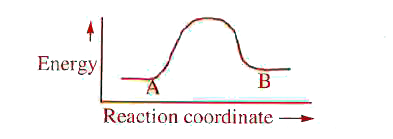For the reaction A→B, the rate law expression is : rate = K[A]. Which of the following statements is incorrect ? Solution in Telugu
The reaction follows first order kinetics
The t1/2 of reaction depends on initial concentration of reactants
K is constant for the reaction at a constant temperature
The rate law provides a simple way of predicting the concentration.
The correct Answer is:B
Step by step video, text & image solution for For the reaction AtoB, the rate law expression is : rate = K[A]. Which of the following statements is incorrect ? by Chemistry experts to help you in doubts & scoring excellent marks in Class 12 exams.
Topper's Solved these Questions
- BOOK - AAKASH SERIESCHAPTER - CHEMICAL KINETICSEXERCISE - OBJECTIVE EXERCISE - 2 (Reaction rates and influencing factors)15videos
CHEMICAL KINETICS
- BOOK - AAKASH SERIESCHAPTER - CHEMICAL KINETICSEXERCISE - OBJECTIVE EXERCISE - 2 (Collision theory)2videos
CHEMICAL KINETICS
- BOOK - AAKASH SERIESCHAPTER - CHEMICAL KINETICSEXERCISE - OBJECTIVE EXERCISE - 1 (Collision theory)14videos
CHEMICAL KINETICS
- BOOK - AAKASH SERIESCHAPTER - CHEMICAL KINETCSEXERCISE - EXERCISE - 3.245videos
CHEMICAL KINETCS
- BOOK - AAKASH SERIESCHAPTER - CHEMICAL THERMODYNAMICSEXERCISE - Additional Practice Exercise54videos
CHEMICAL THERMODYNAMICS
Similar Questions
Consider the following reaction N2(g)+3H2(g)→2NH3(g). The rate of the reaction in terms in terms of N2 at T(k) is −d[N2]dt=0.02 mole lit−1sec−1. What is the value of −d[H2]dt (in mole lit−1sec−1) at the same temperature?
03:24View SolutionThe minimum energy required for molecules to enter into chemical reactionn is called
02:56View SolutionFor a reversible reaction, A⇔B, which one of the following statements is wrong from given energy profile diagram ?
 03:47View Solution
03:47View SolutionDiscuss on the kinetic spontaneity of a chemical reaction. Is a slow reaction spontaneous? Why?
02:13View SolutionWhich among the following is not an exact differential?
02:34View SolutionRate law is an expression relating the rate of a reaction to the
View SolutionFor the reaction A rarr B , the rate law expression is rate =k[A] . Which of the following statements is incorrect ?
03:01View SolutionRate law expression of a reaction is : Rate = k[A]^(2//3)[B] Which of the following are correct about the corresponding reaction ?
02:20View SolutionThe rate law for a reaction A + B to C + D is given by the expression k[A]. The rate of reaction will be
02:05View SolutionA hypothetical reaction has a rate law of : Rate = k[A]^(2)[B] . Which statement about this reaction is most probably correct?
03:55View SolutionFor the reaction A→ B , the rate law expression is : Rate = k[A]. Which of the following statements is incorrect?
02:39View Solutionअभिक्रिया A→B के लिये दर नियम व्यंजक, दर =k[A] है निम्न में से कौनसा कथन सही नहीं है
04:40View SolutionFor the reaction AtoB the rate law expressions is rate =K[A] . Which of the following statements is incorrect?
04:40View SolutionFor a reaction AtoB with activation energy E_(a) and rate constant k=Ae^(-Ea//RT) . The rate of the reaction (Rate =k[A] ) increases by increasing the temperature because
02:34View SolutionReaction A + B to The rate rule for the product is: - Rate = K[A]^1[B]^2 Which of the following statements is incorrect: -
01:54View Solution

